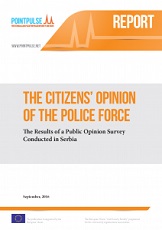2017 THE CITIZENS’ OPINION OF THE POLICE - Results of the Public Opinion Survey Conducted in Serbia
2017 THE CITIZENS’ OPINION OF THE POLICE - Results of the Public Opinion Survey Conducted in Serbia
Author(s): Bojan Elek
Subject(s): Politics / Political Sciences, Politics, Civil Society, Security and defense
Published by: BCBP Beogradski centar za bezbednosnu politiku
Keywords: police force; Serbia; police sector; public opinion
Summary/Abstract: More than half of the population in Serbia (56%) showed trust in the police. Over the last three years, a steady yet small increase in the level of trust in the police has been observed. However, it is still below the global average of 60-90%. A decrease in the perceived level of corruption within the police has been identified. Two out of three citizens (68%) see the police as significantly corrupt. This is a drop from 2016, when this was the opinion of 72% of the population. However, only one out of 25 citizens considers police to be completely free of corruption. The police force mostly operates as a service to the citizens, which is the opinion shared by one out of three respondents (37%). Although this association is a positive one, there has been no improvement in this area when compared to the previous year. Moreover, every second citizen (58%) believes that the police operates the least in this capacity, as a service to the citizens. The above mentioned positive developments warrant no commendation, since the citizens are also acutely aware of other problems that exist within the police, as a result of their own personal experiences – corruption, politicisation and lack of professionalism. Despite these problems that citizens perceive to be at rampant levels, they do not seem to be reflected to a great extent in the level of trust reported. Police ranks second when it comes to perceived levels of corruption, preceded only by the healthcare system. Traditionally, the traffic police are the organisational unit deemed most corrupt by the citizens. Citizens associate policemen mostly with arrogance or crudeness (10%) and see them as corrupt (8%). Despite the fact that policewomen comprise a significant share of the police force, a clear gender bias is evident in the citizens’ perceptions, and their first associations have nothing to do with policing. Namely, policewomen are mostly seen as kind and good looking, but also three times less corrupt than their male colleagues. Citizens have unfavourable opinions of how one gains employment in the police force, listing personal connections with friends and relatives as a means to get to wear the blue uniform (46%). This is followed closely by political connections and public competition as means of finding employment (40% each). Three out of four citizens of Serbia (70%) believe that politics excessively influence the operational work of the police, which is the finding that to some extent contradicts their views of police being a service to the citizens. 7 The citizens are extremely unlikely to report corruption in the police. Regardless of whether reporting is done anonymously or one is required to disclose personal data, almost half of the citizens would not report corruption. Only every fourth citizen (26%) would report corruption in the case they need to disclose personal data, whereas additional one out of three (35%) would do it anonymously. The youngest segments of the population (18-29 years old) tend to have the most negative perception of the police force. The youth exhibits the lowest level of trust in the police; they tend to see police officers as more corrupt than the average population, and the opinion that the police force is politicised is highly present within this group. Based on the results of this survey, several recommendations could be suggested. The police need to communicate the results and outcomes of their work to the citizens more effectively in order to improve their own standing. Much more effort needs to be invested in investigating and resolving the issues related to police work, where citizens tend to have very negative perceptions based on their own experiences. The procedures for reporting and dealing with corruption in the police need to be more easily accessible to citizens but also made more efficient to earn their trust.
Series: BCBP - Assessment of Police Integrity
- Page Count: 24
- Publication Year: 2017
- Language: English
- Content File-PDF

